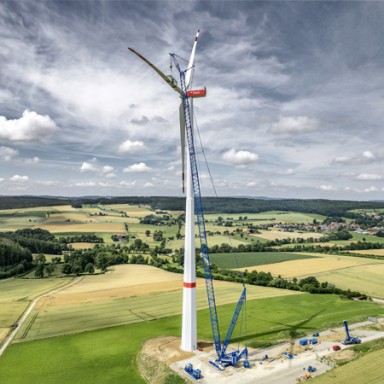Latest news
News and press releases
2025-12-19Listicles
Game of Cranes: Interview with the champion from City Lifting
Scott White, newly crowned world champion mobile crane operator, and Trevor Jepson, managing director of City Lifting, talk about the road to victory, the challenges of the competition, and why precision, responsibility, and passion are essential not only in crane operation but in the entire industry.
Find out more2025-12-18Press releases
Whitnell plant chooses Liebherr PR 736 G8 for versatile earthmoving operations
Family values and engineering excellence come together at Whitnell Plant, where father and son, Lionel and Matt Whitnell, continue a long-standing tradition of hands-on earthmoving expertise. Over decades in the industry, Lionel has built a reputation for skill and commitment, knowledge he now passes directly to Matt as they run the company together.
Find out more2025-12-18Listicles
Wheel loaders in focus: 5 features that make the L 580 LogHandler XPower a timber professional
Timber handling requires power, precision and safety. Efficient processes are essential when feeding, debarking and sorting plants, as well as transporting and stacking round timber. Liebherr developed the L 580 LogHandler XPower - specifically for these tasks – a wheel loader that features specially designed lift arms, various grapple options and the highly efficient XPower travel drive.
Find out more2025-12-18News
Liebherr strengthens its presence in Saudi Arabia with new branch in Riyadh
Saudi Liebherr Company Ltd. has officially opened its new branch in Riyadh, marking a significant milestone in the strategic expansion of Liebherr in the Kingdom of Saudi Arabia. The new location reinforces the company’s commitment to supporting customers across the central region through enhanced proximity, comprehensive services, and long term partnerships.
Find out more2025-12-18Press releases
Liebherr Fibre crane masters lifting operations against stunning backdrop in the heart of Amsterdam
In the middle of Amsterdam’s historic old town, a Liebherr 370 EC-B 12 Fibre is supporting the construction of the new Hotel Amstel 111. The flat-top crane from the rental fleet of Liebherr’s Dutch partner Van der Spek is mastering complex lifting operations along the River Amstel, in an environment defined by narrow access routes and very limited space. The Fibre rope technology guarantees maximum efficiency and precision.
Find out more
Magazines by Liebherr
Exhibitions and events
2026-01-20 - 2026-01-22Exhibitions
www.worldofconcrete.com/en/attendee.html2026-02-10 - 2026-02-12Exhibitions
www.uzbuild.uz/en2026-03-18 - 2026-03-19Exhibitions
www.solids-dortmund.de2026-04-17Exhibitions
www.future4you-bc.de/365t2026-04-24 - 2026-04-25Exhibitions
scotplant.com
Continue reading

Our year in figures
Published every year, our Annual Report looks back in detail at the past financial year. Find out facts, figures and stories from the Group.

Shaping digital transformation
Whether it is IoT, machine learning or cloud applications – discover Liebherr’s wide range of digital solutions.

All about wind energy
As a strong partner to the wind industry, Liebherr offers the right solution for a wide range of requirements.

Social Media
Find your community among Liebherr's many social media channels.